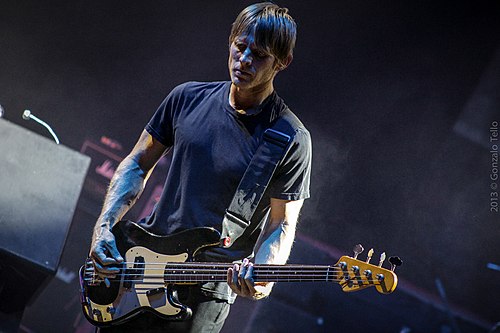History
AC/DC formed in September 1973 by brothers Malcolm and Angus Young, [1] [2] with drummer Colin Burgess (ex-the Masters Apprentices), bass guitarist Larry Van Kriedt and vocalist Dave Evans. [2] [3] [4] The group recorded single "Can I Sit Next to You, Girl" in January–February 1974 at EMI Studios in Sydney, with older brother George Young and Harry Vanda as the producers – both were former members of the Easybeats and Marcus Hook Roll Band. [3] [4] A week after this session Burgess was fired, followed shortly thereafter by Van Kriedt, his recorded bass lines for the January session being re-recorded by George. Their replacements, Neil Smith on bass and Noel Taylor on drums, lasted six weeks, replaced in turn by Rob Bailey and Peter Clack, respectively. [1] [3] [4]
In September 1974, Bon Scott, a vocalist previously with the Valentines (1966–1970) and Fraternity (1971–1973), [3] [4] joined AC/DC after his former bandmate Vince Lovegrove introduced him to George during their stopover in Adelaide. [5] Scott had worked as a driver for the group in that city until an audition promoted him to lead singer. [6] Scott also had experience as a songwriter and drummer. [5] Both Bailey and Clack were fired in January 1975, [2] with Paul Matters taking over bass duties briefly before being fired in turn and replaced temporarily by George or Malcolm for live duties. [3] [4] Meanwhile, on drums, Ron Carpenter and Russell Coleman had brief tenures before Phil Rudd (ex-Buster Brown) joined in that month. [3] [4] Bassist Mark Evans was enlisted in March 1975, setting the line-up, which lasted two years. [3] [4] [7] : 98, 100, 102–103, 109–111 In mid-1977, Mark Evans was fired – he ascribed disagreements with Angus and Malcolm as a contributing factor. [2] He was replaced on bass guitar by Cliff Williams, (ex-Home and Bandit). [3] [4] [6]
In February 1980, after the release of Highway to Hell (1979), Scott died to acute alcohol poisoning. [8] : 106 [9] The band briefly considered quitting, but encouraged by the insistence from Scott's parents that he would have wanted them to carry on, they decided to continue and sought a new vocalist, [6] to which vocalist Brian Johnson (ex-Geordie) was officially announced as the lead singer of AC/DC on 1 April 1980. [10] In April 1983, following an altercation with Malcolm Young and ongoing problems with substance abuse, Rudd was fired from AC/DC. [11] In April 1988, following the Blow Up Your Video World Tour shows across Europe, Malcolm announced that he was taking time off touring, principally to deal with his alcoholism. Angus and Malcolm's nephew, Stevie Young, temporarily replaced Malcolm on guitar. [3] [12] In 1989, Wright left the group to work on American heavy metal band Dio's fifth studio album Lock Up the Wolves (1990); he was replaced by session veteran Chris Slade. [3] [4] Angus and Malcolm invited Rudd to several jam sessions during 1994; he was rehired to replace Slade. [11]
On 23 September 2014, AC/DC members confirmed that Malcolm had officially retired from performing, due to his early onset dementia. [13] He died on 18 November 2017 aged 64, due to the dementia. [14] On 6 November 2014, Rudd was charged with threatening to kill, possession of methamphetamine and possession of cannabis, following a police raid on his home. [15] [16] [17] AC/DC's remaining members issued a statement clarifying that Rock or Bust World Tour would continue, but did not indicated whether or not Rudd would participate, or whether he was still a member. [18] At a charity signing before the Grammy Awards, the band were photographed together with Slade. It was later confirmed that he had rejoined for the Grammys and upcoming tour. [19] Shortly thereafter, the band's web site removed Rudd as their drummer and replaced him with Slade. [20]
On 7 March 2016, the band announced that the final ten dates of the second North American leg of the tour would be rescheduled as Johnson's doctors had ordered him to stop touring immediately: he risked complete deafness if he persisted. The ten cancelled dates were to be rescheduled, "likely with a guest vocalist" later in the year, leaving Johnson's future in touring with the group uncertain. [21] On 16 April 2016, Guns N' Roses front man Axl Rose was announced as the lead vocalist for the remainder of their 2016 tour dates. [22] Williams indicated he was leaving AC/DC during an interview with Gulfshore Life's Jonathan Foerste on 8 July 2016, "It's been what I've known for the past 40 years, but after this tour I'm backing off of touring and recording. Losing Malcolm, the thing with [Rudd] and now with [Johnson], it's a changed animal. I feel in my gut it's the right thing." [23] At the end of the Rock or Bust World Tour, he released a video statement confirming his departure. [24]
After completing the tour in 2016, AC/DC went on hiatus. Over the next few years, speculation grew that former members Johnson and Rudd were back and working with the band again. A fan living near the Warehouse Studio, Vancouver claimed to have observed them in the outdoor area of the studio from an apartment window. [25] [26] The rumors have been confirmed to be true two years later, as on 30 September 2020, they announced the return of Johnson, Williams and Rudd to the line-up alongside Angus and Stevie, reuniting the Rock or Bust line-up. [27] On 9 September 2023, one month before their scheduled show on the Power Trip festival, AC/DC revealed that Williams was part of the line-up after coming out of retirement, [28] and American drummer Matt Laug, who had previously played for Slash's Snakepit and Alice Cooper, replaced Rudd. [29] The Power Up Tour was announced on 12 February, with former Jane's Addiction bassist Chris Chaney replacing Williams. [30]




















